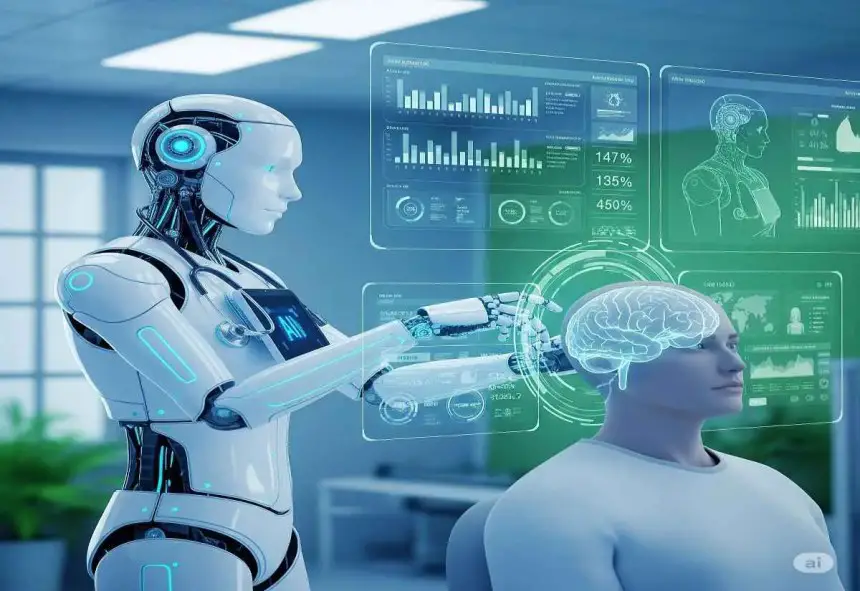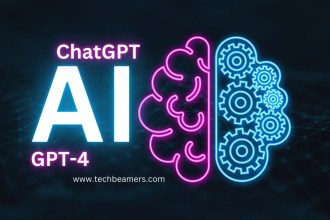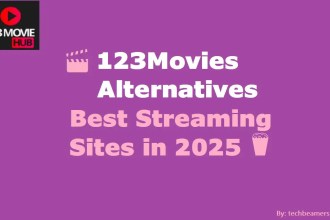AI in Healthcare: Impact on People and Doctors
AI in healthcare is a big help for both patients and doctors. It helps doctors find sickness faster and pick the best treatments. For patients, it spots health problems early, checks test results carefully, reminds them to take their medicine, and makes the whole care process easier and safer for everyone.
What Is AI in Healthcare?
AI in healthcare uses artificial intelligence technologies to analyze medical data, help doctors make decisions, and improve patient care. These smart systems can understand complex health information, spot patterns in medical images, and even predict health risks before they become serious problems. AI tools work alongside medical professionals to make healthcare faster, more accurate, and more personalized.
Why Is AI Important in Healthcare?
Healthcare has big challenges like too few doctors and rising costs. AI helps by making care faster, cheaper, and easier for more people to get. That’s why AI is now a very important part of modern medicine:
- ✅ AI helps doctors find out what sickness a person has much faster. It looks at test results and body scans carefully, so doctors can know the problem quickly and make fewer mistakes.
- ✅ It helps patients wait less time by doing jobs like checking symptoms or managing records. This gives doctors more time to see and treat people faster.
- ✅ AI saves money by doing simple and repeated tasks automatically, like filling out forms or reading test results. This means hospitals can spend less and treat more people.
- ✅ In villages or far-away places where there are no doctors, AI can still give health advice through phones or apps. This helps people get care even if a hospital is far away.
- ✅ AI looks at a person’s past health history and finds warning signs early. It can tell if someone might get sick soon, so doctors can give treatment before it turns serious.
Top 10 Benefits of Artificial Intelligence in Healthcare
AI is changing healthcare in big and helpful ways. It makes things easier for both patients and doctors. Below are some of the most important ways AI is making medical care better, faster, and safer for everyone.
Real-World AI Applications in Healthcare
These practical AI tools are currently transforming patient care worldwide:
PathAI: Smarter Cancer Diagnosis
PathAI uses clever computer programs to help doctors find cancer in tissue samples more clearly and carefully. It points out parts that might be risky but are easy to miss when looking with the eye alone. This way, doctors don’t overlook anything important. Also, it makes the diagnosis much faster — what used to take days now only takes a few hours.
- ✅ Examines tissue samples with very close attention to detail
- ✅ Works with the machines hospitals already have, so no extra tools needed
- ✅ Learns and improves every time it reviews a new case
- ✅ Makes diagnosis twice as fast or more, saving valuable time
Tempus: For Personal Cancer Treatment
Tempus uses smart AI programs to study a patient’s genes and health history. The AI helps doctors choose the best option to fight cancer based on each person’s unique illness. Finding the right approach sooner gives patients a better chance to recover and feel healthier.
- ✅ Analyzes genetic data in context of medical history
- ✅ Identifies clinical trial opportunities
- ✅ Tracks treatment effectiveness in real-time
- ✅ Helps oncologists make data-driven decisions
- Find lumps or tumors in breast scans up to a year earlier than regular checks
- See signs of a stroke on CT scans in under 2 minutes, helping doctors act quickly
- Spot early eye diseases by carefully checking pictures of the back of the eye
- Reduce mistakes where something looks wrong but isn’t, cutting false alarms by almost one-third
A.I. Coming WAY FASTER (than expected)
AI in healthcare is growing really fast—faster than many people thought. Some people wonder if AI might even take the place of doctors one day. Others believe it will only help doctors, not replace them. So, instead of guessing, it’s best to hear directly from someone who works in medicine. Watch the video below to hear a trusted doctor explain how AI could change healthcare and what it really means for patients and doctors.
How AI Is Helping Patients Get Better Care
- Alert you 30 to 60 minutes before your blood sugar gets too low
- Cut down dangerous low blood sugar events by 40%
- Automatically adjust insulin amounts with smart pumps to keep you safe
- Give tips on the best foods to eat and exercises to do based on your health
How to Start Using AI in Healthcare: Simple Steps
2. Look for AI tools made to fix those specific problems.
3. Test AI in one part of the hospital first to see how it works.
4. Teach doctors and staff how to use the AI tools well.
5. Connect AI to the hospital’s existing health record system.
6. Keep checking how AI is doing and make improvements.
Tip: Start with simple tasks like setting appointments before using AI for medical decisions.
Problems and Important Things to Think About
AI can help a lot, but we must be careful about these things:
- 🔒 Keeping patient information safe and private
- ⚖️ Making sure AI treats everyone fairly without bias
- 🤝 Being clear about when humans or AI are responsible
- 💻 Making AI easy to understand and explain
- 🌐 Following laws and rules in different places
• Regularly test AI for fairness and accuracy
• Use strong data protection and control who can access it
• Keep clear records of how AI makes decisions
• Keep training staff about what AI can and cannot do
The Future of AI in Healthcare
AI is just starting to change healthcare. New trends include:
- 🧬 Medicines made just for you using your DNA
- 🩺 Health dashboards that predict illnesses before they start
- 🤖 Robots helping with surgery guided by AI in real time
- 🧠 Tracking mental health by analyzing voice patterns
- 🌍 Systems that predict and track disease outbreaks worldwide
- Going to AI healthcare talks and workshops
- Working with medical schools that teach AI
- Starting with simple AI tools for billing and scheduling
- Using AI to help doctors make better diagnoses
- Joining groups that share AI best practices
Create stunning PowerPoint slides in seconds with AI. No design skills needed – perfect for quick, smart presentations.
Explore Now »




